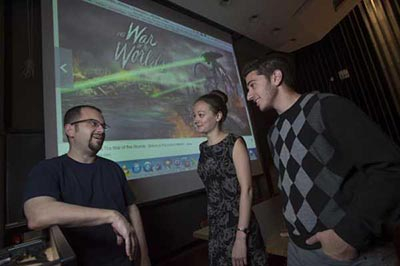Rutgers professor's psychiatry courses use Forrest Gump, Silver Linings Playbook and Seinfeld to illustrate mental illness concepts, clarify diagnoses

'Movies can teach so much about psychopathology and psychiatry, including diagnostics, issues of medical ethics, the stigma of mental illness.'- Anthony Tobia, associate professor of psychiatry, Robert Wood Johnson Medical School
Scene: A darkened lecture hall-turned-cinema. Forrest Gump on the screen, students hunched over computers and cell phones
Action: @alydastab#FIDLER_Gump: Did Jenny just have a flashback? @atobiamd#FIDLER_Gump: Chronic feelings of nothingness and suicidality characteristic of borderline
Welcome to one of the newest psychiatry courses at Rutgers Robert Wood Johnson Medical School where once a month on a Thursday evening some 200 students from Rutgers University and Robert Wood Johnson Medical School gather to watch movies and tweet about them.
“Movies can teach so much about psychopathology and psychiatry, including diagnostics, issues of medical ethics, the stigma of mental illness,” says Anthony Tobia, an associate professor of psychiatry at Rutgers-RWJMS who created the course he offers with assistance from a select group of residents and medical students.
What makes the class novel, he says, is the active Twitter feed, which allows students and teachers to communicate with each other rapidly, in real time, about clinical observations during a movie without disturbing anyone. The tweets – probing questions and astute psychological observations about characters or plot lines – scroll at the bottom of the movie screen. Some students say it’s the closest thing to reading someone’s mind.
“Social media provides a unique method of developing critical thinking and building on clinical knowledge,” says Tobia, who serves as master tweeter for the class. “The Twitter discussion allows me to reach more students and for them to engage with each other in a way a traditional classroom doesn’t allow. The key is having knowledgeable facilitators to guide them on the journey.”
The course — “Film Depictions to Learn Mental Disease,” affectionately known as FIDLER — was approved as a one-credit elective by the Rutgers-RWJMS curriculum committee in 2013. This year Tobia opened it up to psychology students in Rutgers’ School of Arts and Sciences who receive extra credit for attending the movies, shown simultaneously at the medical school and on Livingston Campus.
This year’s movie selections include Silver Linings Playbook, The Matrix, The Rocky Horror Picture Show, Fargo, War of the Worlds and Forrest Gump — which, Tobia says, is particularly rich in psychiatric fodder. Not all films are as psychologically astute as Gump, he says, but they can still make for rich learning experiences.

“I am very sensitive to the fact that movies are made for commercial use, not with the intention to educate. They are far from perfect, but when we get past the flaws, which we always do, movies lend to controlled, consistent case studies that can be used year after year,” Tobia says. “Students can learn just as much from character depictions and scenarios that the movies get wrong.”
Tobia’s interest in viewing art through a psychodynamic lens was sparked as an undergraduate at Lehigh University, reading novels with psychiatric subtexts like Henry James’s The Turn of the Screw and Mary Shelley’s Frankenstein. He became a zealot as a psychiatry resident at West Virginia University School of Medicine under the tutelage of Don Fidler, the psychiatrist for whom the Rutgers course is named.
“Don would have us back to his house for a movie club. I’ll never forget watching Aliens and his remarkable discussion of the movie in the context of sibling rivalry: Sigourney Weaver’s destruction of the eggs of an alien beast as parallel to a child’s psychoanalytical wish to climb into his pregnant mother and destroy the fetus,” he says.
Tobia’s been fiddling with the FIDLER concept ever since. For the last five years he has run a movie club that uses the horror genre to teach mental illness concepts. In another creation he calls “Psy-feld,” Tobia asks medical students to watch Seinfeld reruns the night before morning rounds and uses the episode to kick off discussions that clarify psychiatric diagnoses. “Elaine’s boyfriends are great for learning about the different subtypes of delusional disorders,” says Tobia, who keeps on his computer a nine-year database of 180 Seinfeld episodes with notations on their salient teaching points.
“Dr. Tobia’s thought process is not like the average psychiatrist,” says Maggie Yesalavage a second-year psychiatry resident, who assists with FIDLER screenings and helps guide Twitter discussions. “He sees every subtlety and uses it to make his point for why a behavior or a statement supports a certain psychiatric phenomenon. It’s pretty incredible.”
Marina Gelfand, who teaches undergraduate psychology and is one of two instructors in the School of Arts and Sciences who has offered FIDLER to students as an extra-credit opportunity, says students are captivated. “A lot of students distinguish class from real life, but Dr. Tobia’s unique approach integrates concepts they’re learning into the real world. He does it through movies, which students can relate to,” Gelfand says. “The Twitter discussion connects them to one another, helping them think together as a community.”
For media inquiries, contact Carla Cantor at 848-932-0555 or ccantor@ucm.rutgers.edu.